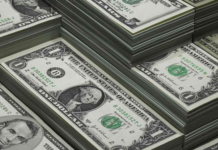Washington/Beijing– Global financial markets plunged on Friday as a trade war between the US and China escalated, with President Donald Trump imposing tariffs worth $60 billion in Chinese imports and Beijing threatening Washington with higher tariffs worth $3 billion for imported American products.
In his strongest trade confrontation with China in nearly a quarter century, Trump signed an order imposing the tariffs and also limiting China’s freedom to invest in the US technology industry.
Financial markets took a hit on fears of a potential trade war between the world’s two largest economies. Trump declared that China was responsible for thousands of lost American jobs and billions in lost revenues.
The Chinese government fired back on Friday, calling Trump’s Thursday announcement “typical unilateralism and protectionism”. China’s Commerce Ministry said the US had set a “very bad precedent” while the Foreign Ministry called the US to make “rational and prudent decisions”.
The US also launched a complaint against China at the World Trade Organization (WTO), the BBC reported.
“China appears to be breaking WTO rules by denying foreign patent holders, including US companies, basic patent rights to stop a Chinese entity from using the technology after a licensing contract ends,” the US government said in a statement.
“China also appears to be breaking WTO rules by imposing mandatory adverse contract terms that discriminate against and are less favourable for imported foreign technology.”
The White House said it was taking action in retaliation for China’s use of pressure and intimidation to obtain American technology and trade secrets.
The measures included a significant change in Trump’s looming steel and aluminium tariffs that would aim them primarily at China, the Washington Post reported.
After Trump’s announcement, China’s Commerce Ministry said it was proposing tariffs on 128 US products including pork, wine and seamless steel tubes.
It will include an additional 15 per cent tariff on products including fruit, nuts, wines and seamless steel tubes and an additional 25 per cent tariff on pork and recycled aluminium products.
“China does not want to fight a trade war, but it is absolutely not afraid,” the Chinese Ministry said. “We are confident and capable of meeting any challenge.
But it also urged the Trump administration to resolve differences through dialogue.
The $3 billion worth of goods that Beijing planned to penalize represented just about 2 per cent of US exports to China, which amounted to $130 billion in 2017, said Chad Bown, a senior fellow at the Peterson Institute for International Economics in the US.
Trump’s actions fulfil his campaign pledge to demand fairer trade deals with countries and to retaliate against trading partners if the US does not secure better agreements.
“We have one particular problem,” Trump said before signing the order that will impose tariffs on hundreds of Chinese products, from shoes and clothing to consumer electronics. “We have a tremendous intellectual property theft situation going on. We’re doing things for this country that should have been done for many, many years.”
Trump said Washington “would no longer tolerate running a trade deficit of nearly $400 billion with China”, its second-largest trading partner, after the EU.
The US administration’s increasing focus on punishing China was evident in its decision to exempt allies like the EU, South Korea, Brazil, Canada and Mexico from what were supposed to be worldwide tariffs on steel and aluminium imports.
The levies, which went into effect on Friday, will largely hit China.
Stock markets were hit by fears that Trump’s tariff plan could trigger a trade war. Japan’s Nikkei share index fell 4.5 per cent and in the US the Dow Jones sank 2.9 per cent. China’s Shanghai Composite Index closed down 3.4 per cent while Hong Kong’s Hang Seng index ended 2.5 per cent lower.
Trump, on March 8, signed proclamations to impose a 25 per cent tariff on imported steel and a 10 per cent tariff on aluminium, causing mounting dissent among trading partners around the world.
Trump had exempted Canada and Mexico from the import levies for the duration of talks aimed at renegotiating the North American Free Trade Agreement. (IANS)






